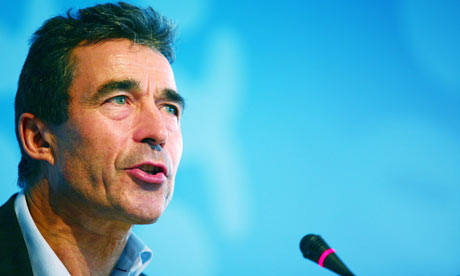Double wow. So we have the UN, and NATO both having their top leaders supporting the concept of using Private Security Companies? Somewhere, a pig is flying over a frozen hell. These things happen in three’s you know. lol –Matt
——————————————————————

”New Challenges – Better Capabilities”
22 Oct. 2009
Speech by NATO Secretary General Anders Fogh Rasmussen at the Bratislava Security Conference
RASTISLAV KACER (President, Slovak Atlantic Commission): We have a little more than 15 minutes, almost 20 minutes time for discussion. Let me take a few questions for you from the audience and let me cluster those by maybe two or three so you would be able to answer, is it fine with it, and then I’ll turn also to our participants in the universities and I’ll take also questions from Banská Bystrica.
But first, questions from the floor. I see one hand over there, and one hand over here. Please. If you could wait for the microphone so we can… and don’t forget to introduce yourself.
Q: Thank you. My name is Dominika (inaudible) and I’m a Ph.D. candidate at the Faculty of Political Sciences and International Relations at Banská Bystrica.
Mr. Secretary General, I would like to ask you, you are speaking about the new security environment, changing security environment, as well as capabilities that NATO is trying to somehow push forth. Speaking about the new security environment, there is the problem of privatization, so-called privatization of security and the emergence of new non-state actors, be it the bottom up or top down process.
I would be interested more in the top-down process, which will include the problem of private military companies. As we know some of the core member states of NATO, namely the United States, are using them in the conflict, namely the conflict in Iraq. What would be the position of NATO as such to use the private military companies or other security contactors on behalf of NATO in its operation as a means to boost its capabilities or to fill in for some possible capability caps?
And more broadly put, how is NATO ready to cope with the problem of the privatization of security and the privatization of military conflicts as such. Thank you very much.
RASTISLAV KACER: Thank you very much for very interesting questions. Second question goes to Mr. Smolar from Poland, and the third question will go to Banská Bystrica.
EUGENIUSZ SMOLAR (Senior Fellow, Center for International Relations): Mr. Secretary, thank you very much for sharing with us your thoughts and I look through the project you’ve presented, and one thing which I haven’t seen is a modernization of NATO itself. And it’s very hard to imagine that you can deliver all those good things unless NATO, as a structure, transforms itself. Three hundred committees, commissions, you know, the ambassadors’ relations with U.S., Secretary General, national government, this is a very complex web of interests, and ingrained interests, I might add.
How do you see NATO in a few years time, because it has to streamline its operation and its structures itself. Thank you.
RASTISLAV KACER: Okay and the last question for this round goes to Banská Bystrica, then I would kindly ask you for the answers, Mr. Secretary General. Banská Bystrica, you are online.
Q: Good morning, and (inaudible…) and International Relations within Banská Bystrica. We all know there comes a very long tradition of threats such as cyber attacks or energy security threats or even climate change-related dangers are high on the NATO agenda. However, do you think NATO is the best forum for dealing with such problems? What is its additional value to countering these threats in comparison to other international organizations? Thank you.
RASTISLAV KACER: Thank you all for three very good questions. Now Secretary General, now you can spend additional two hours on those. (Laughs).
ANDERS FOGH RASMUSSEN (Secretary General of NATO): I could, but I won’t. I will answer briefly.
First about what you called privatization of security and more specifically the use of what you called private military companies. Well, basically I do believe that NATO operations should be conducted by what we might call official military units led by our responsible governments, so this will be my clear point of departure.
Having said that, I will not exclude the possibility that private security companies as such can be used for specific security tasks, protection of facilities, protection of people in certain areas. So I would not completely exclude the possibility of using private companies, but of course, we have to strike the right balance and basically our military operations should be conducted by our military……
Link to the rest of the Q and A here.
